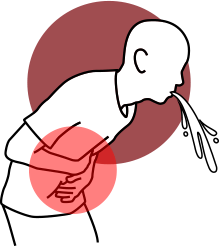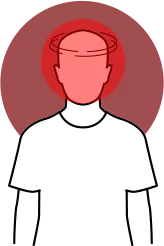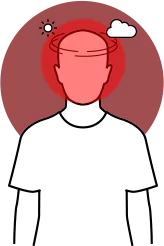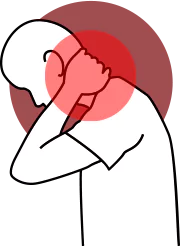Migraine Headache Treatment
Overview
Migraine Headache Signs & Symptoms






Aura
Auras can appear before or during migraines for certain people. Auras are reversible nervous system symptoms.
Examples of migraine auras include:
- Visual manifestations, such as seeing diverse forms, bright spots, or flashes of light
- Vision loss
- You’re on pins and needles a feeling in one’s arm or leg
Migraine Attack
If left untreated, a migraine can persist anywhere from 4 to 72 hours and frequency might vary from person to person. Migraines might hit once a month or numerous times a month.
You might experience the following symptoms during the migraine:
- Pain on one side of your head, but commonly on both sides
- Nausea and vomiting
- Pain that throbs or pulses
- Light, sound, and occasionally smell or touch sensitivity
Migraine Post Drome
When To See A Doctor?
Migraines are undetected and mistreated far too frequently. Keep track of your migraine episodes and how you dealt with them if you experience them on a regular basis. Schedule a consultation with a specialist to address your headaches.
- Consult your doctor if the pattern of your headaches changes or if your headaches feel different.
- An intense, sudden headache, similar to a thunderclap.
- Fever, stiff neck, disorientation, seizures, double vision, numbness, or weakness in any region of the body, all of which might indicate a stroke.
- A persistent headache that becomes worse after coughing, exercise, straining, or an abrupt movement.
- New headache discomfort after 50 years of age.

Alleviate Migraine Headaches With Our Specialized Treatment
What Are The Causes?
Migraines happen due to various factors, as follow:
- Hormonal changes in women: Many women get headaches when their oestrogen levels fluctuate, such as before or during maenstrual cycles, pregnancy, or menopause.
- Drinks: Alcohol, particularly wine, and too much caffeine, such as coffee, are examples.
- Stress: Migraines can be brought on by stress at work or at home.
- Sleep patterns shift: Sleep deprivation or excessive sleep can cause migraines in certain people.
- Changes in the weather: A migraine can be triggered by a change in weather or barometric pressure.
- Additives to foods: Many foods include artificial sweetener aspartame and preservative monosodium glutamate (MSG).
Best Treatment For Migraine
The goal of migraine headache therapy is to alleviate symptoms and avoid future occurrences. We don’t recommend taking any medication without your doctor’s prescription. There are two types of medications used to treat migraines:
- Analgesics (pain relievers): These medications, often known as acute or abortive therapy, are administered during migraine attacks and are intended to relieve symptoms.
- Medication for prevention: To minimize the severity or frequency of migraines, these medications are used on a regular basis, typically daily.
Acute Migraine Treatment For Relief
- Triptans: Prescribed drugs such as rizatriptan (Maxalt, Maxalt-MLT) and sumatriptan (Imitrex, Tosymra) are used to treat migraine because of their ability to block pain pathways in the brain. When taken in the form of pills, shots, or nasal sprays, they can relieve many migraine symptoms. The drugs could not be used by those at risk of strokes or heart attacks.
- Dihydroergotamine (D.H.E. 45, Migranal): This medication can be used as a nasal spray or injection, and its effectiveness is best when taken shortly after the start of migraine symptoms if the migraine persists longer than 24 hours. Side effects might include migraine-related nausea and vomiting.
- Opioid Medications: Narcotic opioid medications might help people who can’t take other migraine medications. These are highly addictive and are usually used only when all other options have failed.
- Anti-nausea Medications: These will if migraine with aura is accompanied by vomiting and nausea. Chlorpromazine, metoclopramide (Reglan), or prochlorperazine (Compro) come under the anti-nausea drugs and are usually taken along with pain medications.
